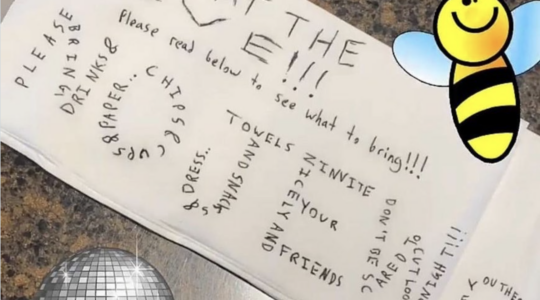SEATTLE (JTA) – Prosecutors wrapped up their case against Naveed Haq in the 2006 shooting at the Jewish Federation of Greater Seattle, but not before the jury saw his guns and the clothing of the woman who was killed, and listened to terrified 911 calls from inside the building that day.
Also Wednesday, the court heard a computer expert detail hundreds of Google searches Haq had made in the days leading up to the shooting.
The defense began its case with testimony from Haq’s mother, who talked about her son’s descent into his mental illness.
One week before the murder of Pamela Waechter and the shooting of five other women on July 28, 2006, a prosecution witness testified that Haq spent early mornings and late nights searching the Internet.
Seattle Police Det. Thomas Luckie, a computer forensics expert, said that among the hundreds of sites he visited were scores of pornography sites, Muslim and Middle East news sites, sites of Jewish members of the U.S. Congress and the site of the American Israel Public Affairs Committee.
Luckie said the searches on the day before the shootings were broad at first but over time became more targeted.
“On July 27, 2006, [Haq] searched CNN specials and the Mideast crisis,” Luckie testified. “He searched the Iraq war, the situation in the Middle East, and Pakistan missile technology.”
Haq’s search records from July 23 to July 26 of that year also showed searches about Hezbollah and the resistance until he finally focused on AIPAC seminars in Seattle and throughout the United States.
In a precinct interview after the shootings, Haq told police he originally thought he would attack an AIPAC event, but that he changed his mind because he believed it would be too complicated. That evidence was suppressed by the judge because Haq was not provided an attorney after repeated requests.
Finally settling on the downtown Seattle Jewish philanthropic agency, the prosecution said Haq downloaded directions to its front door from MapQuest, traveled the 227 miles to Seattle and waited in its unlocked foyer until Kelsey Burkum, 14, showed up at the building.
That’s when he put a gun to her back and told her to be careful as she waited to be admitted. The two then climbed the stairs to the second floor, where he asked for a manager, and began to shoot.
Prosecutor Donald Raz focused the court’s attention on a text document file found by Luckie and written by Haq named KUTBAH.doc. The title was “The Sources of Muslim Anger.”
In a khutbah, the Arabic word for a special teaching or sermon, Haq wrote about the plight of Muslims throughout the world. He sympathized with Jews who have suffered under persecution, but wanted Muslims to better themselves and to gain more power.
“If things don’t change there will be a very bloody future,” Raz quoted from the document. “Jews are overrepresented in American politics. Muslims are excluded.”
Defense attorneys are expected to put several doctors on the stand who will show that Haq was mentally ill for more than a decade, hoping the court will accept the premise that he was insane at the time of the shootings.
Haq has been found competent and able to stand trial.
To establish insanity, the defense must prove that its client could not distinguish between right and wrong, and could not form the intent to plan this crime, according to Washington law.
Haq has been diagnosed with bipolar disorder and schizoaffective disorder, according to a psychiatrist who treated him for depression and attempted suicide at the University of Pennsylvania in 1998, while he was a dental student there.
Defense witness Dr. Alexandra McLean testified out of order on Monday, but later in the day Judge Paris Kallas ruled her testimony inadmissible due to more recent diagnoses from Haq’s doctors prior to the trial.
“I diagnosed him with schizoaffective disorder,” McLean told the court about her diagnosis in 1999. “He was still angry, crying, persecuted.”
McLean also said that Haq reported being “put off” from his family, and that he felt he was pressured to attend dental school.
Almost immediately after the shootings Haq’s computers, weapons, ammunition, letters to his brother and other evidence were seized from his eastern Washington apartment and the room he occupied in his parents’ home.
Detectives also found seven prescription medications in his Kennewick apartment.
Alan Cruise, a Seattle homicide detective who was on the team of investigators who flew to the residences at 1 a.m. the next morning, also testified Monday that Haq’s apartment was virtually empty except for his guns and laptop computer.
“It looked like someone was either moving in or moving out,” Cruise told the court. “We found a knife, a shotgun box and shotgun with some sort of strap tied to it, and a Remington 870 shotgun manual.
“There was no bed, a laptop, a factory box to a pistol, a Ruger, a receipt for a Ruger and ammunition.”
The defense objected to the jury hearing certain incriminating statements Haq made to police after his arrest, as well as those he made during state-ordered interviews with doctors who would evaluate his mental health.
Kallas has not yet ruled on the admissibility of testimony from the state’s medical expert, who is relying on some of those statements to form his opinion.
The judge has allowed comments Haq made voluntarily to police during transport but would not admit the interview with detectives following the shooting.
JTA has documented Jewish history in real-time for over a century. Keep our journalism strong by joining us in supporting independent, award-winning reporting.





